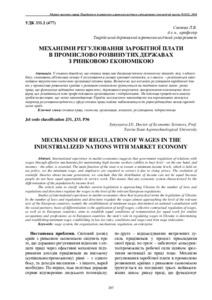Please use this identifier to cite or link to this item:
http://elar.tsatu.edu.ua/handle/123456789/6291Full metadata record
| DC Field | Value | Language |
|---|---|---|
| dc.contributor.author | Синяєва, Людмила Василівна | - |
| dc.contributor.author | Синяева, Людмила Васильевна | - |
| dc.contributor.author | Syniaieva, Liudmyla | - |
| dc.date.accessioned | 2019-03-22T12:06:30Z | - |
| dc.date.available | 2019-03-22T12:06:30Z | - |
| dc.date.issued | 2016 | - |
| dc.identifier.uri | http://elar.tsatu.edu.ua/handle/123456789/6291 | - |
| dc.description.abstract | UK: У статті доведено, що оплата праці має багатоаспектну економічну природу, яка, з одного боку, становить об'єктивну основу її регулювання в умовах кризової економіки, а з іншого, – реалізується законодавчо закріпленою системою організації оплати праці. Визначено, що механізм регулювання заробітної плати у промислово розвинених країнах з ринковою економікою ґрунтується на поєднанні таких ланок: ринку праці, що функціонує відповідно закону вартості; державного втручання; використання колективних договорів, що укладаються між профспілковими організаціями і підприємцями. На підставі проведеного аналізу зроблено висновок, що чинне законодавство України за кількістю законодавчих та нормативних актів та напрямів регулювання відносин у сфері оплати праці майже наближається до рівня відповідних актів європейських країн. EN: International experience in market economies suggests that government regulation of relations with wages through effective mechanisms for maintaining high income workers (ability to buy) level - on the one hand, and incomes - the other, is essential. The main function of the state is to ensure a minimum income levels, which is held on tax policy, set the minimum wage, and employers are required to correct it due to rising prices. The evolution of scientific theories about income generation, we conclude that the distribution of income can not be equal because people do not have equal opportunities in service work. This means that any economic system characterized by the differentiation of the population by income level. The article aims to clarify whether current legislation is approaching Ukraine by the number of laws and regulations and directions regulate the wages to the level of the relevant European regulations. Studies of international experience in market economies show that in practical terms the legislation of Ukraine by the number of laws and regulations and directions regulate the wages almost approaching the level of the relevant acts of the European countries, namely the establishment of minimum wages determined on national consultation with the social partners; basis of differentiation is the application of tariff wages; collective contractual regulation of wages, as well as in European countries, aims to establish equal conditions of remuneration for equal work for similar occupations and professions; as in European countries, the state's role in regulating wages in Ukraine is determining and establishing minimum wage, establishing in law tax rules, conditions and wages and trim wage indexation. | uk |
| dc.language.iso | uk | uk |
| dc.relation.ispartofseries | Збірник наукових праць Таврійського державного агротехнологічного університету (економічні науки);№ 3 (32) (C. 207-216) | - |
| dc.subject | оплата праці | uk |
| dc.subject | система | uk |
| dc.subject | організація | uk |
| dc.subject | механізм | uk |
| dc.subject | регулювання | uk |
| dc.subject | підприємство | uk |
| dc.subject | wage system | uk |
| dc.subject | the organization | uk |
| dc.subject | mechanism | uk |
| dc.subject | regulation | uk |
| dc.subject | an enterprise | uk |
| dc.title | Механізми регулювання заробітної плати в промислово розвинутих державах з ринковою економікою | uk |
| dc.title.alternative | Mechanism of regulation of wages in the industrialized nations with market economy | uk |
| dc.type | Working Paper | uk |
| Appears in Collections: | Кафедра Менеджменту та публічного адміністрування | |
Show simple item record
CORE Recommender
???jsp.display-item.check???
Items in DSpace are protected by copyright, with all rights reserved, unless otherwise indicated.

